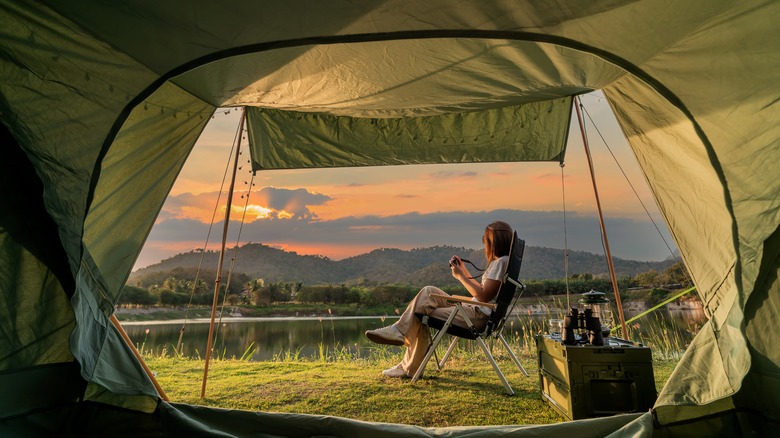Navigating The Stigma Of Choosing To Be Alone
We hear quite a bit about extroverts versus introverts, social butterflies versus lone wolves, and even single life versus married life. These all relate to how people choose to spend their time and — more specifically — with whom they choose to spend that time. The COVID-19 pandemic brought the social preferences and habits of humans further into the forefront in everything from working environments to child development discussions. Worldwide voluntary and involuntary isolation during the pandemic led some introverts to even joke about spending time alone without the societal pressures to do the exact opposite. Still, it's not easy to navigate life alone.
As the world is returning to some sense of normalcy and as social events come back, human social preferences remain a talking point between friends and even among psychologists. At the same time, different lifestyle choices are gaining more acceptance among society at large. However, the lone wolves of the world still face stigmas surrounding their desires to spend time in solitude.
Onlookers may assume that someone has no friends if they are out alone
Humans are social creatures. Why else would solitary confinement be considered a punishment? Interacting with other humans is ingrained into society and into our minds. The benefits of doing so are legitimate and have been studied at length. Being among friends and family boosts one's mood, while working in collaborative settings can yield better results in the workplace. Given all of these factors, the fact that some people enjoy spending time alone is still foreign to others, so much so that there are negative stigmas about being alone by choice or not.
Seeing someone at a restaurant or movie theater alone makes onlookers assume that that person does not have any friends. Perhaps because of a lack of friends, the person dining or watching a movie solo is not doing so by choice and must live a depressing life.
Psychologists offer explanations as to why people enjoy solitude
Psychologists push back on these stigmas to validate the decisions of so-called loners. Those who choose to be alone are not suffering any silent battles or sitting at home alone doing nothing. Instead, they are pursuing passions and doing activities that they enjoy. Some are focusing on their self-development, creativity, or spirituality. Some just genuinely enjoy peace and quiet and find their alone time to be fulfilling (per Psychology Today).
Psychologists not only explain that people do genuinely enjoy spending time in solitude. They have also explained the benefits of doing so. According to Very Well Mind, solitude forces imagination onto the brain to fill the void of the stimulation that human contact provides. This leads to more creativity. It also allows people to do the things that they enjoy without judgment, time limits, or possible ridicule from failure. Being alone can provide a mental reset if one is experiencing irritability or overstimulation as well.
People have discussed why they enjoy spending time alone
People who enjoy spending time alone are doing their part to eliminate the stigmas by explaining why they prefer solitude, often echoing the claims from psychological studies. "Being alone can be joyful and productive. Empowering, even," writes Emma Balter for the Houston Chronicle. "I'm at my most productive and creative [when spending time alone]." Balter goes on to explain that she does not identify as an introvert, as some may assume. Being social and also enjoying time alone can coexist in one person.
Getting over the societal stigmas of choosing to spend time alone involves finding out where those stigmas come from. This stems from the fact that most people care about how they are perceived by others. People do not want to appear as if they have social anxiety or have few friends (per Discover Magazine). Society deeply values quantity — as shown by the common desire to have thousands of followers on social media because it makes us feel important — but also shows others that we have lots of friends, or at least admirers.
Stigmas around being alone stem from public perception
Stigmas around doing activities alone also have double standards that relate back to public perception as well. It feels normal to grocery shop alone, but not to go out to dinner or to a movie alone. Stigmas accompany activities society deems unacceptable to do alone. This makes people wonder if they would actually enjoy doing something like seeing a movie or going to a concert alone. Society tells us that we shouldn't, but only because we worry that onlookers will think that we do not have friends if we do (per Discover Magazine).
So how do we overcome these stigmas and enjoy the full potential of alone time? We can look at how in general, different lifestyles are gaining more public acceptance. The U.S. Declaration of Independence states that everyone has the right to "life, liberty, and the pursuit of happiness." Championing that latter part is encouraged now more than ever. Gen Z, in particular, is choosing happiness, whatever that looks to the individual.
It helps to explain to friends and family why you need to be alone
Explaining why you need time alone can help others understand. You can start by telling friends and family ahead of time that you will be taking time out of your day to be alone. Perhaps include the activities that you will do during this time so that they can better understand why you desire to have some solitude. Getting some alone time may require a bit of thinking outside the box. Try waking up early or taking a walk, as suggested by Very Well Mind. Offering explanations allow friends and family to realize that you are not giving them the cold shoulder. It's nothing personal!
Ironically, navigating through the stigmas of choosing to be alone helps when you realize that you are not alone. There are plenty of people in the world who enjoy their own company just as much, if not more than, the company of others. And perhaps those who do not spend any time alone should give it a try once in a while.





